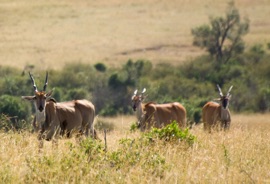kenyaView







Water and Urea Recycling
Water use also varies between the different species of animal on the Savannah. In the process of breaking down proteins into amino acids, so that they can be used by the mammal body, ammonia is produced, which is a poison. This is converted into urea by the kidneys, and the urea is then excreted in the urine. This excretion requires the urea to be dissolved in water.
However, some ruminants have a way to recycle urea, so that it does not need to be excreted, thus reducing their need for water. The urea is passed back to the rumen, where the bacteria can use it as food. As these bacteria travel down the animal's gut, they are digested and provide extra protein for the animal, over and above what was in the plants they ate. This urea re-cycling thus has a double benefit for the animal.
Herbivore Variety: Water
Sweat and Temperature Regulation
As well as dissolving urea for excretion, water is used to regulate the temperature of the body through sweating. In order to reduce the need for water for sweat, some animals allow their body temperature to rise during the day, and use the night air to cool it down again. The Eland, for example, may allow the body to rise 7ºC, saving an estimated 5 litres of water per day. With the water from the plants it eats, the eland can go without drinking water for very long periods.
This elevated body temperature, however, would normally kill the brain. Those animals which allow elevated body temperature also have a blood system which uses the long muzzle (nose) to cool some blood passing through it, which blood then pools beneath the brain to cool the blood passing through other arteries directly to the brain, thus keep the brain's temperature cooler than that of the body. Primates, such as humans, cannot do this.
The hippopotamus is at the opposite extreme. It has unusual skin, which is without sweat glands but which loses water directly at a much higher rate than other mammals. It therefore needs to stay in water for most of the daytime, and usually only emerges to eat grass in the cool of the night. The hippo's closest animal relative is thought to be the whale.


Depending on how much water is contained in their preferred plants, animals ruminants will be able to go a relatively long time without taking water directly, and in some cases may not need to do so at all, getting all they need from plants.